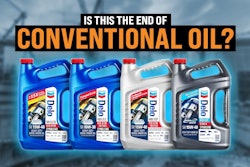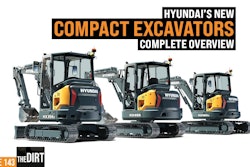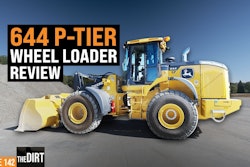In this episode of The Dirt, we take a closer look at a new machine control provider for the North American market, offering “a cost-effective, user-friendly system with built-in flexibility.”
Unicontrol is a Scandinavian manufacturer of 3D machine control technology focused on smaller contractors and compact equipment. Rich Hilliker, Unicontrol’s managing director for North America, tells host Bryan Furnace that product offers “everything the operator needs and nothing more” because it was developed in collaboration with contractors.
The system is compatible with other manufacturer’s base stations and rovers, or you can purchase Unicontrol’s positioning equipment. Hilliker says the company will have automatics available for dozers beginning in December. Unicontrol also offers machine control solutions for excavators, wheel loaders and skid steers of all size classes.
To find out whether this might be the system for you, check out the latest episode of The Dirt.
Equipment World serves up weekly videos on the latest in construction equipment, work trucks and pickup trucks – everything contractors need to get their work done. Subscribe and visit us at equipmentworld.com!
In This Episode:
00:00 - What Is Unicontrol
00:35 - How Is Unicontrol Different From Other Machine Control Companies?
01:43 - What Kind of Machine Is Unicontrol Best For?
03:22- Does Unicontrol Work on Larger Machines Too?
04:39 - Is Unicontrol Compatible With Other Brands?
06:45 - Is Unicontrol Machine Control Automatic or Indicate Only?
09:12 - How to Learn More About Unicontrol
09:44 - Final Thoughts
Bryan Furnace (00:00):
This equipment world Video is brought to you by Chevron Delo 600 ADF ultra low ash diesel engine oil. It's time to kick some ash.
(00:09):
Today we're here to talk about Unicontrol, which is a brand you might not be familiar with in the machine control realm, but they've actually been around for a while overseas and now they're starting to hone in on the American market. And they've got some unique packages to offer us, things that other third party GPS vendors don't have. But before I give away the details, let's turn it over to Rich from Unicontrol.
(00:35):
Well, Rich, thank you so much for being on the show today. I appreciate your time.
Rich Hilliker (00:39):
Yeah, thank you Bryan. It's good to be here.
Bryan Furnace (00:40):
So the first question is, Unicontrol, really what makes you guys unique? What sets you apart from other machine control GPS manufacturers in the market?
Rich Hilliker (00:50):
Yeah, that's a great question, Bryan. Unicontrol is a new entry into the market and has a unique approach really focusing around the operator and not around the engineer or the surveyors. So everything we have is designed around simplicity and exactly what the operator needs in the cab. Nothing more.
Bryan Furnace (01:06):
As an operator, I will say that is really nice because engineers have a unique way of taking the most needed button and bearing it three layers deep in the menus.
Rich Hilliker (01:18):
Exactly, yeah. I'm not a professional operator by any means, but I also know exactly what you're talking about. We just need exactly what's needed on the run screen at any one time. And all the other functions are still there. They're just in the right spot and put away where they need to be. And also, you can lock it down so the operator only sees certain buttons. Or if it's an owner operator and wants to see a little bit more, they can do that. It's all configurable.
Bryan Furnace (01:42):
Great. So for a lot of people in the industry that are probably not familiar with the name Unicontrol, where are they primarily going to see your equipment function and what kind of section of the market are you guys serving, if you will?
Rich Hilliker (01:53):
So yeah, good point. Unicontrol is a new name, especially in the United States. Our company's based in Denmark, so a lot of our machines are there. We should be approaching somewhere around 2,000 machines out in the market.
Bryan Furnace (02:05):
Oh, wow.
Rich Hilliker (02:06):
Primarily we have focused on the smaller equipment and some underserved parts of the market, smaller contractors, smaller equipment. So my philosophy is any size job, any size operation, any size machine. So we can really get on most anything as far as excavators go. But you can also see our equipment on big machines as well. But the underserved part of the market was really the small machines and small contractors like plumbing and underground guys that have never really had machine control before and really didn't have an entrance into this. And it's technology that can help most everybody.
Bryan Furnace (02:40):
It's interesting. I'm in 100% agreement. It does feel like a lot of the initial GPS movement was really centered around those big road guys. The airport construction, heavy civil. And there's a huge section of the industry that's just doing residential basement digs, like you said, plumbers who just need to be able to pitch a pipe without having someone on a laser and a grade rod. And largely up until this part of time, we just kind of, "You got your laser and grade rod. Sorry, but not sorry." And it's nice to see companies kind of coming back and going, "No, no, no, no. You guys, we've got a product for you. We're bringing you along into the technological era as well." It's really, really nice. But that being said, you say you focus on the smaller portion of the market. Just to clarify, that doesn't rule you out of the bigger machines. If I've got a 349 excavator on a road job, you guys have the ability to interface with those machines as well?
Rich Hilliker (03:34):
Yeah, of course. Yeah. In fact, the 349 is a lot easier to install on than a small mini excavator. So we like doing the big machines. And as the company got started in Europe, they figured that their primary sandbox would just be the small machines instantly. They said within the first couple months they started getting customers that say, "Let's do this. Let's do the bigger machines." And of course that was really an easier installation without swing boom, without anything technical or rota tilts. Things that complicate a little bit, but still we can address.
Bryan Furnace (04:06):
I guess I'd never really thought about the actual install process. It would be substantially easier on a machine that you don't have the world's tiniest hands and be able to squeeze into the tiniest compartment to actually get... I bet the machines that are big are pretty easy.
Rich Hilliker (04:20):
Oh, yeah. We installed for a plumbing contractor in Arizona recently. He got great utilization out of everything that we did, especially out of the basin rover. But I realized my shoulders are a little bit too big to squeeze underneath that calve and get all the wires strung in the right place. So I'd much rather be on a ladder with the big machine.
Bryan Furnace (04:37):
Yeah, absolutely. So the next question I have is for guys who are already kind of keyed up and they already have a GPS system, whether it's Trimble or Leica or Topcon, does Unicontrol have the ability to piggyback off of one of those existing systems? Or is this a situation where, "Man, now I got to go buy a brand new rover, brand new base station that's going to broadcast on Unicontrol system"?
(05:02):
But before we get into that, I want to take a second to tell you about the sponsor of this video. Chevron Lubricants. Protecting your diesel engine and its exhaust after treatment system has traditionally been seen as an either/or proposition when it comes to choosing the engine oil that's going to protect your system. And that's exactly why Chevron spent more than a decade of R&D work, developing a no compromise formulation.
(05:24):
Now, I don't have to tell you why a clogged DPF is bad news, but here's the real kick in the pants. 90% of that ash clogging up your DPF and then upping your fuel and maintenance costs, it comes from your engine oil. You might be thinking, "Why don't they make an engine oil with less ash in it then?" You'll be happy to learn that Chevron agrees with you. They've developed a new ultra low ash diesel engine oil that is specifically designed to combat DPF ash clogging. Delo 600 ADF with OMNIMAX technology cuts sulfate ash by 60%, radically reducing the rate of DPF clogging and extending the DPF service life by two and a half times. Before, you had to choose between protecting your engine or your aftertreatment system. Now you don't. Delo 600 ADF with OMNIMAX technology, it's time to kick some ash.
(06:15):
Does Unicontrol have the ability to piggyback off of one of those existing systems? Or is this a situation where, "Man, now I got to go buy a brand new rover, brand new base station that's going to broadcast on Unicontrol system"?
Rich Hilliker (06:27):
Yeah, you don't have to do that. I mean, of course we have a base available and we have a very simple rover interface as well as far as software goes. But if you already have a Trimble base or Leica base or anything else, we can use it. It's just fine. In fact, it all falls into the exact same localization process. So if you already have a Leica rover for example, or Trimble, that's absolutely fine. We can use it.
Bryan Furnace (06:50):
Excellent. So that's one of the biggest stumbling blocks for a lot of people moving into a different GPS system. Now I'm going to hit you with the Achilles heel of all of the, kind of in my mind, third party GPS machine control companies. Can you guys actually interface with the machine to give me true machine control or these really largely indicate only systems?
Rich Hilliker (07:13):
Our tagline is machine control made simple. And I never felt like that was quite accurate because we were indicate only, until now. Until now it really brings me a sense of pride to announce this on your show that we have automatics available. And I'm not saying that it's off in the future. We're developing it. It's ready right now. We can have these systems shipped month of December, it's fine. And I'm speaking on dozers.
Bryan Furnace (07:38):
Yeah, absolutely. And that's huge for the boots on the ground people where we're struggling to find competent operators. It's one thing if I can put someone in a machine that at least knows how to... Let's say the dozer for example. If they at least know the basics of grading, I can give them an indicate only system and they're going to do okay, but they're still not going to be super productive. It's a whole different thing when I can put someone in a machine that actually has the automatics to where I can say, "Okay, now I know this person. As long as they stay in my little area that I know is the safe zone that we have actual GPS files on, they're going to be okay." That's huge when it comes to a production standpoint.
Rich Hilliker (08:15):
Yeah, exactly. We're coming into the market with a whole different price point with a different approach, like I said, around the operator. And that was a big stumbling block coming into the United States market because we've always considered it a saturated market. However, I don't know a whole lot of customers that actually have complete one brand for anything. There's no way they're going to have everything down to their skid steer, all Caterpillar, all John Deere or what have you. And we kind of follow that same philosophy. So it's up to us to be able to slide into that operation on whatever piece of machinery that they need Unicontrol on, wherever it makes sense. And it's hard to tell what that would be. It might be that 349 and it might be the track loader. It's hard telling. We've been doing some steel track loaders too across the country, which I had never seen here out west. That's the machine. That's the one they need. They've never had indicate on it before, so that's where we enter. And then they're really happy with our interface and have a whole new approach.
Bryan Furnace (09:10):
That's Awesome. Well, super exciting stuff. If someone's curious about getting more information on a Unicontrol system, who do they need to contact? What would be the best path forward?
Rich Hilliker (09:18):
So the best path is to get right on our website and you can see if there's a dealer that's located in your area. If there's not, sometimes we're behind and we haven't listed them yet. Or you can reach out to our company directly and that'll probably get you to me or one of our other colleagues here in the United States, and we'll be able to push it the right direction. But we will definitely get back to you and look forward to talking with anybody that has an interest in Unicontrol.
Bryan Furnace (09:39):
Awesome. Well thanks again, Rich. This is awesome stuff. Great news.
Rich Hilliker (09:42):
Thank you very much, Bryan. Really appreciate it.
Bryan Furnace (09:44):
Well, thank you again for Rich coming on the show and teaching us a little bit about what Unicontrol has to offer. And as you can see, there are some real advantages, primarily in the sense that they can interface with the machine on dozers so far and actually give you automatics. So we're in a really exciting time with machine control. Prices are slowly starting to come down as this technology gets more and more attainable for the small businesses out there. So as always, I hope this helps you and your business. And we'll catch you guys next time on The Dirt.








